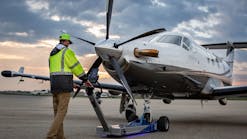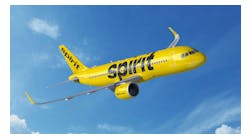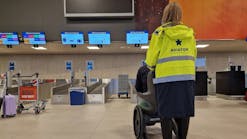The European Union and the United States emerged from five days of negotiations Friday reporting substantial progress toward an agreement to open up more American airports to more European airlines.
In a joint statement, they said they made "substantial progress on the key elements of such an agreement," promising to seek "early and successful results" in the next round of talks beginning in Washington on Nov. 14.
In addition, they said they want to achieve "further liberalization of the trans-Atlantic aviation market," beyond the so-called "Open Skies" deal on airline market access.
The 'Open Skies' deal would replace a web of bilateral deals between Washington and EU governments - which regulate trans-Atlantic air traffic - with a single EU-U.S. deal.
EU spokesman Stefaan de Rynck said EU and U.S. negotiators made good progress in crafting compatible approaches in antitrust, security, environmental and other issues.
In Washington, the talks will focus more on freeing up the U.S. market for European airlines, the most crucial part of the negotiations.
"There is work that remains to be done," De Rynck said, adding that freer access to American airports for EU carriers "will be a key issue for discussions in Washington."
The chief U.S. negotiator is John Byerly, U.S. deputy assistant secretary of state for transport.
De Rynck said the EU seeks a "balanced package in terms of traffic rights" that would allow "any EU airline to fly from any point in the EU to any point in the United States ... and stop the fragmentation we currently see."
Looming over the talks is an issue that has long caused trans-Atlantic friction: the EU wants Washington to lift restrictions on foreign ownership of American air carriers.
The Bush administration has indicated that is negotiable and de Rynck said American enthusiasm to change the law accordingly was "an important contextual issue for us" in the "Open Skies" negotiations.
In the joint statement, the EU and the United States said, "There is ... a clear commitment on both sides to achieve further liberalization of the trans-Atlantic aviation market" beyond the "Open Skies" agreement.
In 2002, the EU high court ruled Washington's bilateral aviation deals with EU nations illegal, saying under EU rules the European Commission must negotiate such accords on behalf of all EU governments.
Replacing those bilateral deals with a single EU-U.S. agreement is bound to add $5 billion in business and 17 million passengers for the aviation industry annually, according to EU data.
At the moment, EU airlines can only operate routes between their home countries and the United States, which caps the number of airlines flying the trans-Atlantic route.
Some 60 percent of all world air traffic flies into or out of the EU and the United States and 40 million passengers travel between the two each year.
"Open skies" agreements aim to improve market opportunities for airlines, promote common security, safety and environmental standards and foster technical cooperation.
Within the EU, the issue has led to friction with some governments fearing their airlines will not get as a good a deal under an EU-U.S. umbrella accord than what they have negotiated with Washington.
The EU head office has had to press all EU governments hard to renege their air service agreements with the United States.
Last March, it sent legal warnings to 11 governments that have bilateral "open skies" accords with Washington, bringing to 20 the number of countries it has brought to court.
At the moment, Britain takes up the lion's share of trans-Atlantic routes, accounting for 40 percent of all traffic between the EU and the United States and making London's Heathrow airport is the world's busiest international hub.
Richard Branson's Virgin Atlantic Airways has urged the EU to seek much better access to American airports for European carriers. He has accused Washington of wanting to see American airlines able to fly within Europe, but refusing European carriers from flying within the United States.
News stories provided by third parties are not edited by "Site Publication" staff. For suggestions and comments, please click the Contact link at the bottom of this page.





